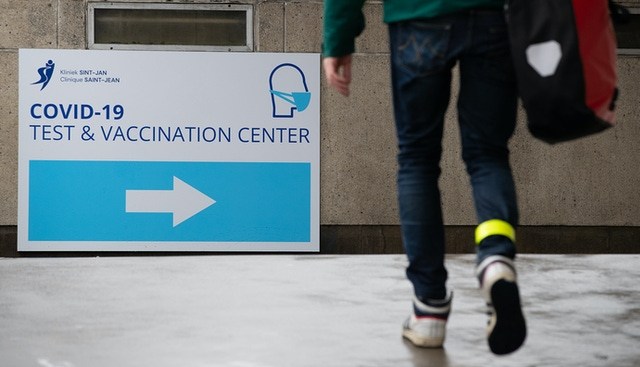In the Brussels-Capital Region, just over four in ten young people (aged between 18 and 34) have received their first dose of a Covid vaccine, compared to eight in ten in Flanders.
The lower vaccination rate among the Brussels population in general, but especially among young people, means that about 40% of all of Belgium's Covid patients in ICU are in a Brussels hospital.
"We continue to inform people through all kinds of social media, through posters and campaigns running in the municipalities," Inge Neven of the Brussels Health Inspectorate said on Flemish radio.
"Additionally, we have our local branches - which have had great success with the elderly population - and we are now also driving around with five buses, stationing ourselves in the most precarious neighbourhoods with a low vaccination rate and going to make people aware that they can get vaccinated immediately, right in front of their door," she added.
Those vaccination buses - which are deployed in Brussels' uphill battle to get its population vaccinated - also go to events, such as the Foire du Midi, where people can just drop in to get vaccinated with a single-dose Johnson & Johnson vaccine.
"About 40 to 100 vaccines a day are put into those buses. Those are still quite low numbers, but by reaching them we set a snowball effect in motion," Neven said. "More and more people become interested in getting vaccinated."
As of Tuesday 27 July, in the 18 to 34 age group, only 44% have been vaccinated at least once in Brussels, compared to 81% in Flanders and 64% in Wallonia.
Related News
- Brussels' uphill battle to get its population vaccinated
- Brussels launches 'vaccine bus' to get population vaccinated
- Brussels GPs can now also vaccinate patients against Covid-19
Several reasons why so few young people got their jab are the same as for the older population: Brussels is one of the most cosmopolitan cities in the world, with residents of 184 different nationalities and with many different cultures.
Partly due to that large number of different nationalities, young people are not always easy to reach through regular government communication and media.
That is also why the Brussels government is working with religious leaders, as well as informal leaders, to better reach certain population groups in the region.
That same strategy has been used with the older population as well, and the degree of protection in these age groups has increased considerably in the meantime: among the over-45s, 70% have now been vaccinated, among the over-65s, this rose to more than 80%.
"And they are the population groups that are most at risk," said Neven, adding that whether this will also work with younger people remains to be seen.
"We can only try to reach everyone as best we can, but at some point, it is also up to people to get vaccinated," she added, stating that she remains hopeful.
"If you look at the figures for the over-65s, I assume that - with a bit of a delay - it will be the same with the younger people."

